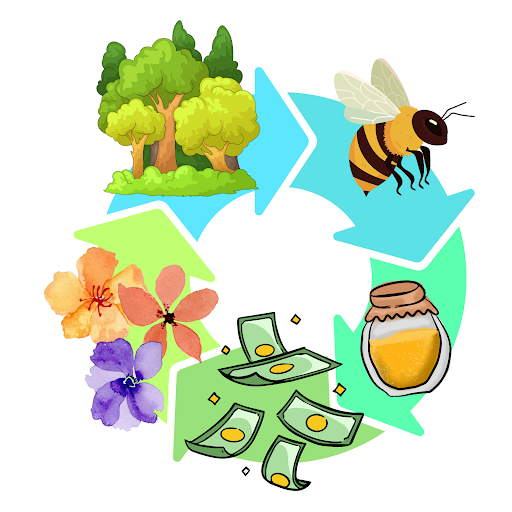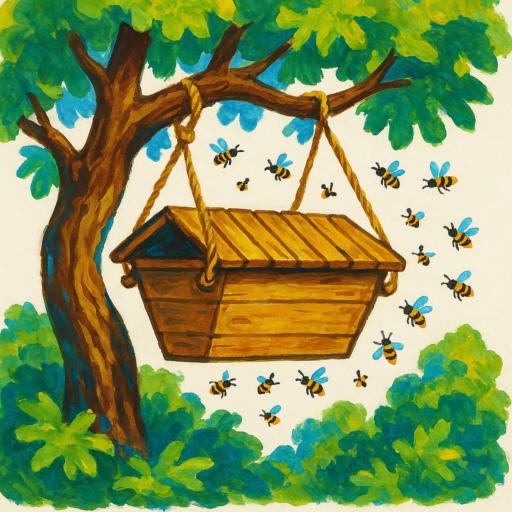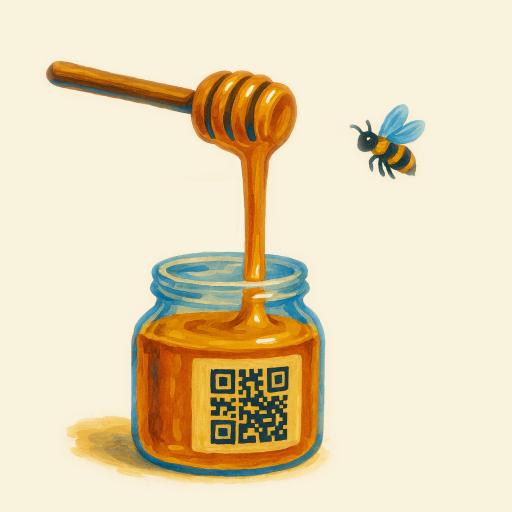Zambia’s economy depends on copper. The copper mines bring jobs and foreign trade, but they also bring population growth, deforestation, and pressure on rural landscapes. In areas surrounding the country’s copper belt, trees are cut for timber, fuel, and farmland to support industry - and people. Even traditional beekeeping - once a sustainable forest-based livelihood - has become part of the problem.
For generations, Zambian beekeepers have used bark hives: hollowed sections of tree trunk hung high in the canopy, like a sweet buzzing Christmas ornament. Though charming, each of these hives costs a tree. What’s more, harvesting the honey is a perilous, invasive project that is dangerous for the beekeepers and detrimental to the hive. With global demand for “wild African honey” growing sharply - more than 700 percent in recent years - this traditional practice no longer aligns with conservation goals.
Beekeeping as a Counterweight
Nature’s Nectar Zambia, co-founded by Katherine Milling and Kyle Curry, set out to prove that the forest itself can be a source of income worth protecting. Nature’s Nectar is part honey company, part conservation partner, and part social enterprise. Working in partnership with communities, conservation projects, and the Zambian government, the company has built a model that aligns economic and ecological incentives.
The company equips about 3,000 small-scale beekeepers managing 30,000 hives across more than forty communities. Instead of bark, the hives are made from locally sourced pine. They are not the stackable “box hives” that are familiar to beekeepers in the Americas and Europe. Instead, they use “Top Bar Hives. They are both cost effective to build and they allow beekeepers to still follow traditional beekeeping practices. They also last much longer than a bark hive, and best of all, they don’t require felling the old-growth trees that anchor Zambia’s biodiversity. Nature’s Nectar deploys these hives to a new community one thousand at a time. Each distribution of a thousand hives equips around a hundred beekeepers in a single community to earn a stable income from forest flowers and honey - rather than from clearing land.
Another fascinating detail of this approach to honey-making is that the bees are not installed in the hives by human keepers, nor are the colonies managed and split the way it’s often done in box hives. African honey bees are a bit more assertive than their fuzzy European kin, and nobody wants the job of telling them what to do. Instead, swarms of native African honey bees are allowed to find the hives themselves. The top-bar hives are, not coincidentally, just the size and shape that a swarm on the move would find appealing. This is the natural way in which bee colonies replicate themselves in the wild. When Kyle described the roar of a wild swarm taking to the air in search of a new home, his enthusiasm was contagious!
“I don’t call it beekeeping—it’s a housing project for bees. We charge rent by taking honey,” Curry says with a grin.
Values in Action
Nature’s Nectar works through existing community structures in Zambia. Chiefs and headmen designate forest areas for beekeeping, and elected Zone Lead Farmers oversee training, hive placement, and harvesting. Roughly half of participating beekeepers are women. This balance is not an accident, but is a reflection of the company’s core values. They process the honey at a solar-powered facility in the capital, Lusaka. Powering this - or any - operation is not a small detail in Zambia. The power grid is anchored in hydro-electric plants, but the country has experienced drought and unpredictable weather patterns due to climate change. No water means no power in the grid for up to 18 hours each day, so the choice to go solar is both sustainable and practical.
.png)
Conservation Partnerships in Unlikely Places
Nature’s Nectar collaborates with the West Lunga Conservation Project, the Forestry Department, and the Department of National Parks and Wildlife. Some of the project’s early funding even came from mining companies seeking to offset their environmental footprint. These unlikely allies are engaged in a shared experiment to balance economy and ecology.
Can forest protection become a shared responsibility among government, private enterprise, and local residents? Can incentives be balanced in a cycle of good — one that extracts value both from the earth and for the earth?
Challenges on the Ground
Progress depends on patient, practical work. Many rural participants have limited literacy and their own complicated contexts that may include social, economic, and political challenges. Infrastructure is thin. Securing ongoing funding requires ongoing legwork and networking. So-called “Impact” investors sometimes expect financial returns that don’t match the realities of rural enterprise.
But even when everything clicks into place and there’s a pallet of jars full of wholesome honey, there’s another problem: African honey does not have any easy path into the global marketplace, due to a lack of trust in the product.
The Next Layer
So the next frontier is traceability. Nature’s Nectar is experimenting with digital tools for data validation and identity management in collaboration with blockchain partners such as Palmyra on the Cardano blockchain network. The aim is to link every jar of honey to its whole origin story: the forest, the flowers, the hive, the beekeeper, and the processing facility. The bet is that transparency and traceability will provide the trust layer that opens doors to global markets and consumer cupboards. Indeed, when a product is fully traceable, you don’t need to trust – you can know.
“The name of the game for us is transparency,” Curry says. “That’s how farmers and employees can ultimately become owners.”
A Regenerative Loop
For Nature’s Nectar, the next challenge is proving what it already knows: that this new kind of extraction can sustain itself while nourishing the planet. That profit and preservation can share the same flow: bees pollinate forests that stay standing; forests sustain communities that maintain the hives; and honey sales feed both local incomes and conservation budgets. In a country where extractive industries dominate, Nature’s Nectar offers evidence that production and preservation can reinforce each other.

Forest value: Communities designate forest zones for beekeeping instead of logging. ➡️ Top-bar hives: Built from pine, houses bees without destroying trees. ➡️ Honey: Collected and processed under organic standards. ➡️ Income loop: Honey sales raise household earnings while supporting conservation ➡️ Ecological feedback: Pollination boosts biodiversity & supports healthy forest
Proving it is where data needs to come in. If every hive and beekeeper is logged, photographed, and monitored, it can build a living story of ecological value. New digital tools and blockchain integrations will soon allow every jar of honey to carry its own proof of origin.
It’s still extraction, in a way — but the kind that leaves the forest standing.
Call to action
- Have an idea for a conservation or research partnership? Reach out through the contact form on their website — they’re eager to collaborate.
- Follow @NaturesNectarZM on X
- Brand builders and storytellers: Nature’s Nectar is developing its own consumer-facing brand. If you have branding or marketing expertise, get in touch!
- Stake your ada with ZAM pool
- Donate ada to ada handle $naturesnectar
- Donate dollars on the website. 100% of ada or dollars donated goes to hive production and distribution.
- Visit the website! https://www.naturesnectarzambia.com/
Author’s Note: This story is the first in a three-part series exploring Nature’s Nectar Zambia and the emerging role of blockchain in regenerative enterprise. Next up: “Honey, Trust me"




No comments yet…